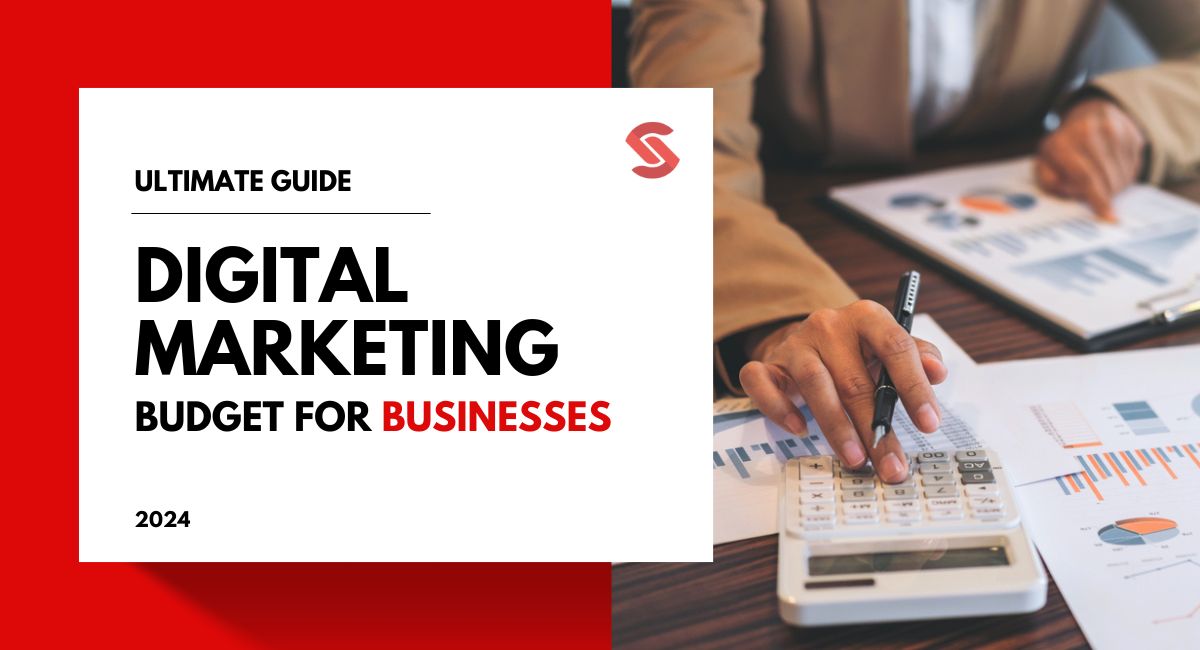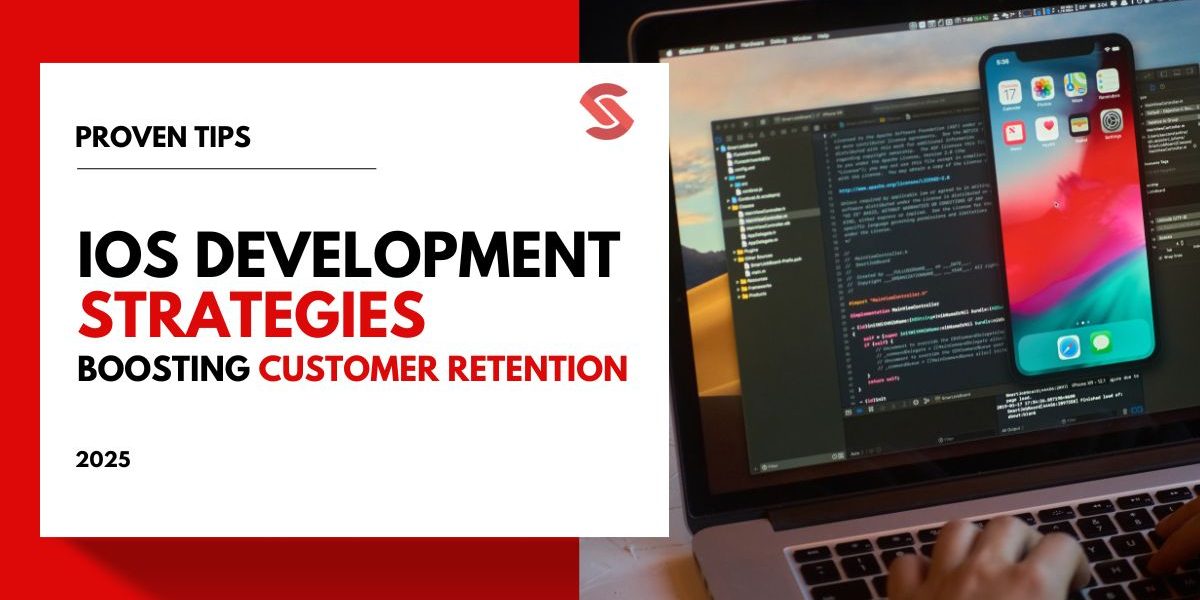Whether you are launching your brand online or already have a good reputation digitally; digital marketing is what makes it more visible, but figuring out how to allocate your budget can truly shape your online success. Budgeting is key! It’s what can make or break your efforts digitally.
But why is it so crucial? Well, first you need to carefully plan and execute your digital campaigns to ensure you’re getting the best return on your investment. In this blog, we’re diving deep into budget and planning for all things digital. From making every dollar count to ensuring your investments pay off, we have the insights you need to get the digital marketing with confidence in the right amount.
Understanding Digital Marketing Expenditures
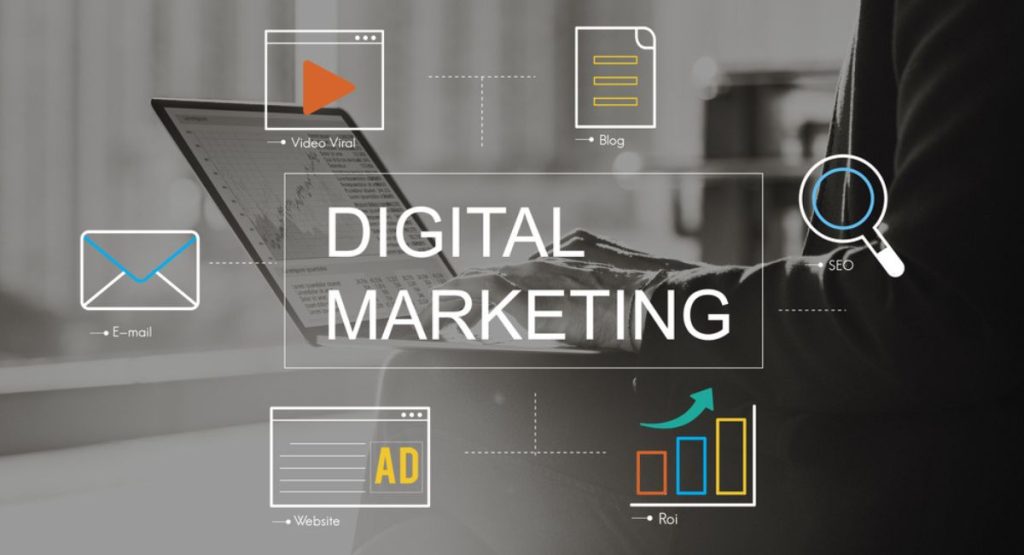
It’s good to understand which digital marketing services you should invest in; this involves dissecting the various costs associated with online advertising and promotion.
- One significant expenditure is Pay-Per-Click (PPC) advertising, where businesses pay each time a user clicks on their ad.
- SEO services expenses focus on improving website visibility in search engine results, requiring investments in keyword research, content optimization, and link building. However, accessing an affordable SEO services guide for small businesses can significantly contribute to your brand’s online success.
- Content marketing involves costs related to creating engaging and relevant content, such as blog posts, videos, and infographics, to attract and retain customers.
- Social media marketing services include expenses for promoting products or services on platforms like Facebook, Instagram, and LinkedIn, including ad creation, targeting, and management fees.
Understanding these digital marketing expenditures allows businesses to allocate budgets effectively, optimizing ad spend and maximizing returns. By investing strategically in PPC, SEO, content writing services, and social media advertising, businesses can enhance their online presence, drive traffic, and ultimately boost conversions and revenue.
How Much Do Businesses Typically Spend?

Determining how much businesses spend on digital marketing involves examining industry benchmarks and trends. According to recent studies, small businesses allocate around 10-15% of their total budget to marketing efforts, whereas medium-sized enterprises may allocate 6-12%, and large corporations often invest upwards of 10-20%. These figures vary based on industry sector and competitive dynamics. For instance, sectors like technology and finance tend to allocate a higher percentage of their budget to marketing compared to others.
Industry surveys provide valuable insights into sector-specific spending patterns. For example, a survey by a leading marketing research firm revealed that companies in the retail sector spend an average of 10% of their revenue on marketing, while professional service firms allocate closer to 8%. Understanding these averages and trends allows businesses to benchmark their marketing budget allocation against industry standards and competitors. By aligning spending with these benchmarks and considering their specific goals and resources, businesses can optimize their marketing investment for maximum impact and return.
Setting Your Digital Marketing Budget
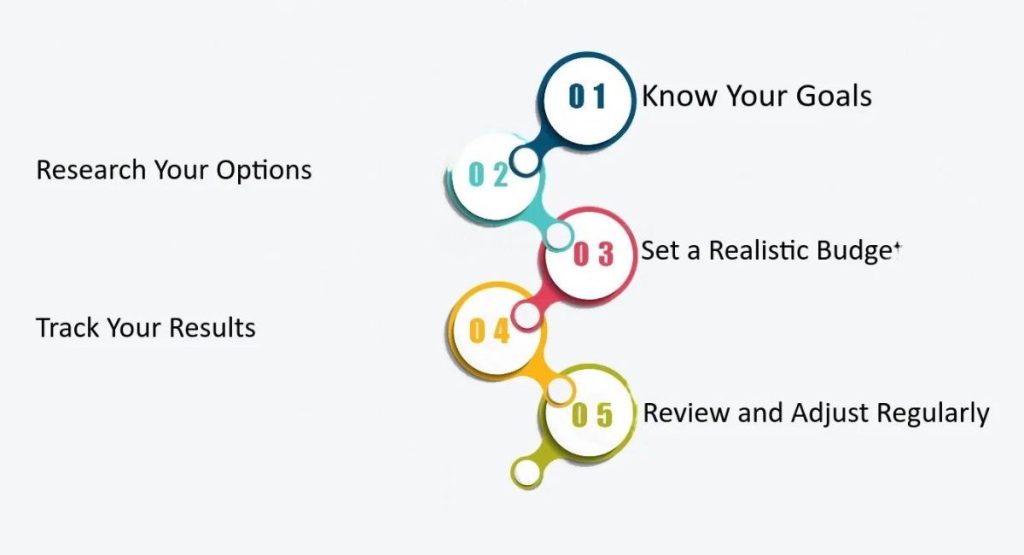
This entails a strategic approach to aligning financial resources with business objectives. These several key steps are very important in the application development process as well; they ensure that the allocated budget drives maximum impact and ROI. Firstly, businesses need to clearly define their goals, whether it’s increasing brand awareness, driving website traffic, or boosting sales.
- Define Business Goals: Clearly outline the objectives you aim to achieve through digital marketing, such as increasing brand awareness, driving website traffic, or boosting sales.
- Understand Target Audience: Conduct thorough audience analysis to identify demographics, preferences, and behavior patterns, guiding where to allocate the budget for maximum impact.
- Establish Marketing Objectives: Define specific goals for your digital marketing campaigns, such as increasing engagement, generating leads, or improving conversion rates.
- Allocate Budget: Determine the amount of financial resources to allocate to digital marketing efforts. Industry standards suggest allocating 7-12% of total revenue for marketing, with approximately 45-50% of that budget dedicated to digital channels.
- Monitor Performance: Continuously track and evaluate the performance of your digital marketing initiatives to gauge effectiveness and adjust budget allocation as needed. Especially when you are spending on PPC Services.
However, this figure can vary based on factors like industry sector and growth goals. For instance, businesses may allocate more budget towards platforms where their target audience is most active. Moreover, defining specific marketing objectives is essential. Whether increasing engagement rates, generating leads, or improving conversion rates, each objective requires a corresponding budget allocation.
Allocating Your Budget across Digital Channels
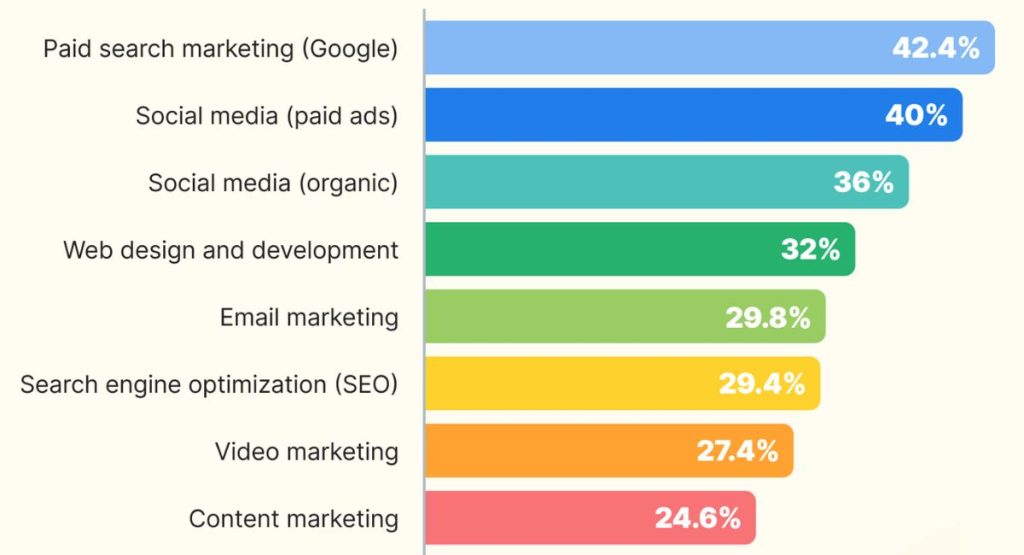
Breaking down your budget across digital channels involves strategic decision-making to optimize spending and maximize returns. Each platform offers unique opportunities and challenges, requiring businesses to prioritize spending based on channel performance and alignment with business objectives.
Google Ads, for example, remains a dominant player in online advertising, with businesses typically allocating a significant portion of their budget toward search and display ads. Studies show that Google Ads have an average ROI of 200%, making it a compelling choice for businesses aiming to increase website traffic and conversions.
Similarly, Facebook Advertising offers extensive targeting options and high audience engagement rates, making it effective for brand awareness and lead generation campaigns. On average, businesses allocate around 25-30% of their digital marketing budget to social media marketing services, with Facebook being a primary focus.
LinkedIn marketing, known for its B2B targeting capabilities, is preferred by businesses aiming to reach professionals and decision-makers. However, the cost-per-acquisition on LinkedIn tends to be higher compared to other platforms, so budget allocation should be adjusted accordingly.
YouTube Advertising presents opportunities for video content promotion, with businesses typically allocating 10-15% of their digital marketing budget to video advertising campaigns. By analyzing channel ROI, click-through rates, and audience engagement metrics, businesses can strategically distribute their marketing budget across digital channels to achieve optimal results and drive business growth.
Best Practices for Allocating a Budget for Digital Marketing
Effective strategies for allocating a budget for digital marketing involve careful planning and strategic decision-making. Here are some best practices to guide your budget allocation process:
Evaluate Past Performance: Analyze the performance of previous marketing campaigns to identify successful channels and tactics.
Set Clear Objectives: Define specific goals for your digital marketing efforts, such as increasing website traffic, generating leads, or improving conversion rates.
Allocate Budget Strategically: Prioritize spending based on channel performance and alignment with business objectives. For example:
- Allocate 40% of your budget to channels that consistently deliver high ROI, such as Google Ads or email marketing campaigns.
- Dedicate 30% of your budget to experiment with new channels or tactics to diversify your marketing strategy and reach new audiences.
- Reserve 20% of your budget for ongoing optimization and testing to fine-tune your campaigns for better performance.
- Keep 10% of your budget flexible for unforeseen opportunities or emergencies.
Monitor and Adjust: Continuously monitor the performance of your digital marketing efforts and adjust budget allocation as needed to optimize results.
By following these best practices, businesses can allocate their digital marketing budget strategically, maximizing cost efficiency and driving sustainable growth.
Budget Calculation Tools
When it comes to managing your digital marketing budget, having the right tools can make all the difference. These tools can help you plan, track, and optimize your spending to ensure you get the most bang for your buck. Here are a few budget calculation tools that businesses can consider:
- Google Sheets: A simple and versatile option for creating and managing budgets, Google Sheets allows you to collaborate with team members in real time and customize your budget templates to suit your specific needs.
- FreeAgent: This financial management software offers features like expense tracking, invoicing, and tax forecasting, making it a comprehensive solution for small businesses looking to manage their budgets efficiently.
- Allocadia: Designed specifically for marketing teams, Allocadia provides tools for planning, tracking, and optimizing marketing budgets and investments. Its features include cost prediction and budget monitoring to help businesses stay on track with their spending goals.
- HubSpot Templates: HubSpot offers a variety of budget templates and tools to help businesses plan and manage their marketing budgets effectively. These templates can be customized to fit your business needs and integrated with other HubSpot tools for seamless budget management.
- Knowlium: Knowlium offers budgeting and forecasting software designed to help businesses make data-driven decisions about their marketing investments. Its features include cost prediction, budget monitoring, and analytics to track the performance of your marketing campaigns.
These budget calculation tools are great for your businesses to streamline operations with the budgeting process, track their spending more effectively, and make informed decisions to optimize their marketing investments.
How Softnix is the Best Option for Digital Marketing Services
Softnix can enhance your online visibility with years of expertise in digital marketing, whether it’s about developing effective content marketing strategies or staying updated with trends, fostering teamwork, and prioritizing client feedback. Through data analysis, Softnix can understand audience preferences and tailor campaigns accordingly. By keeping abreast of emerging trends, Softnix can incorporate innovative approaches into its strategies.
Encouraging collaboration between teams fosters creativity and ensures comprehensive solutions. Moreover, actively listening to client feedback enables Softnix to refine strategies and meet specific needs. By implementing these practices, Softnix can develop more impactful campaigns, effectively reaching and engaging target audiences, thereby achieving better results digitally.
Conclusion
In conclusion, mastering digital marketing budgeting is essential for achieving marketing success and long-term growth. Strategic planning ensures financial efficiency and maximizes the impact of marketing efforts. By aligning budgets with business goals and industry benchmarks, companies can optimize their marketing funds for maximum ROI.
Additionally, staying adaptable is crucial in the ever-evolving digital landscape. Businesses must be prepared to adjust their budgets and strategies based on changing market dynamics and emerging trends. Ultimately, by prioritizing strategic budgeting and maintaining adaptability, businesses can enhance their marketing efficiency and ensure financial sustainability in the competitive digital marketplace.
FAQs about Digital Marketing for Businesses
1. What are digital marketing services?
Digital marketing services encompass various online marketing activities aimed at promoting brands, products, or services through digital channels such as search engines, websites, social media, email, and mobile apps.
2. How does SEO impact digital marketing?
SEO (Search Engine Optimization) enhances a website’s visibility in search engine results, increasing organic traffic and improving the effectiveness of other digital marketing strategies by ensuring content is tailored to target audience needs and search behaviors.
3. What is the role of content in digital marketing?
Content is fundamental in digital marketing as it engages and educates the audience, builds brand presence, and drives conversions through compelling and valuable information tailored to the audience’s interests and needs.
4. Can digital marketing help in lead generation?
Yes, digital marketing strategies such as email marketing, content marketing, SEO, and social media campaigns are effective in generating leads by reaching and engaging potential customers where they spend most of their time online.
5. What is PPC and how does it work?
PPC (Pay-Per-Click) is an advertising model in digital marketing where marketers pay each time their ad is clicked. It’s used primarily in search engine advertising and social media campaigns to quickly generate traffic and leads.
6. How important is social media in digital marketing?
Social media is crucial for digital marketing as it provides platforms for direct customer interaction and content sharing, significantly expanding reach and enabling precise audience targeting based on demographics and behaviors.
7. What metrics should I track in digital marketing?
Key digital marketing metrics include website traffic sources, conversion rates, lead generation costs, click-through rates (CTR), social media engagement levels, and ROI (Return on Investment) to measure the effectiveness of various campaigns.
8. How does mobile marketing fit into digital marketing?
Mobile marketing is integral to digital marketing, focusing on reaching target audiences on smartphones and tablets through SMS, MMS, mobile apps, and responsive websites, crucial given the increasing use of mobile devices globally.
9. What is email marketing and why is it effective?
Email marketing involves sending targeted and personalized messages to a list of subscribers to educate, inform, and convert them into customers. It remains highly effective due to its direct approach and ability to provide detailed analytics.
10. How do analytics improve digital marketing?
Analytics help marketers understand user behavior, optimize campaigns, and make data-driven decisions, thereby improving strategy effectiveness and maximizing the ROI from digital marketing efforts.
11. What is the difference between inbound and outbound digital marketing?
Inbound marketing attracts customers by creating valuable content and tailored experiences (e.g., SEO, content marketing), while outbound marketing reaches out to audiences broadly through advertising and cold calling.
12. How can I choose the right digital marketing channels for my business?
Choosing the right channels depends on your business goals, target audience, and budget. It involves understanding where your audience spends their time and how they prefer to receive information, whether through social media, search engines, or email.

